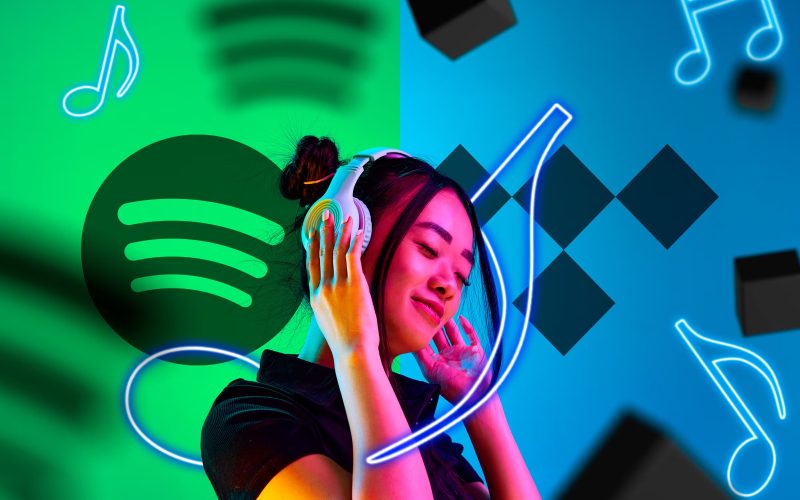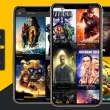Introduction
Social media has changed the music industry in many ways. It helps artists connect with their fans, share new music, and promote their work. Platforms like Instagram, TikTok, Twitter, and YouTube are essential tools for music promotion today. This article looks at how social media is used in the music industry, how it helps artists grow, and some challenges it brings.
The Growth of Social Media in Music Marketing

In the past, marketing music involved expensive advertising and big promotions. Today, social media allows artists to reach fans instantly and at a much lower cost. This shift has changed how songs and albums are shared and discovered. Musicians now use social media to engage with their followers directly and get instant feedback on their music.
Key Benefits of Social Media for Music Marketing:
- Immediate Communication: Artists can quickly share news about new songs, albums, or tours. Fans can interact with them right away.
- User-Created Content: Fans help promote songs by sharing videos, creating memes, or joining challenges. This helps songs go viral.
- Targeted Ads: Social media platforms allow artists to show ads to specific people who might like their music, based on interests and location.
How Different Social Media Platforms Help in Music Promotion
Each social media platform has a unique role in promoting music. Let’s look at how artists use each one:
1. Instagram: Visual Content and Engagement
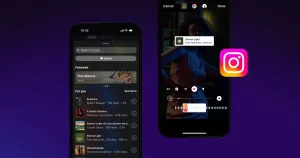
Instagram is all about pictures and short videos. Artists can post behind-the-scenes photos, videos, and updates on their music. With features like Stories and live streaming, Instagram allows artists to connect with their fans in a more personal way.
2. TikTok: Viral Music Trends

TikTok is one of the most powerful platforms for discovering new music. Users create short videos using popular songs, and sometimes these videos go viral. Many songs have gained worldwide attention because of TikTok challenges, and it’s an important platform for music discovery.
3. Twitter: Real-Time Interaction
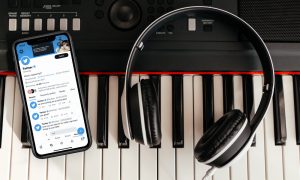
Twitter is great for fast updates and conversations. Artists use Twitter to share news, thoughts, and engage with their followers. Fans can join the conversation using hashtags, and the platform keeps music discussions going around the clock.
4. YouTube: Video Content and Music Videos
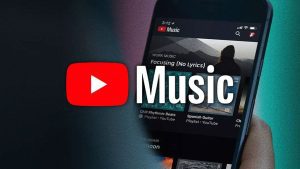
YouTube is still the place to watch music videos. Artists release their official music videos, live performances, and even behind-the-scenes footage on YouTube. This platform helps artists reach a wide audience, and artists can make money from views through ads and YouTube Music.
Social Media’s Effect on How We Listen to Music
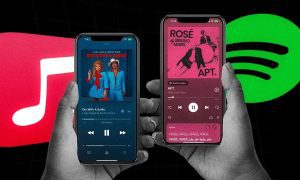
Social media has also changed how people listen to music. Before social media, people discovered music through radio or TV. Now, they use social media to find new songs. Artists share their music directly with fans, who then share it with others, making it easier for new songs to spread quickly.
Social Media and Music Streaming Services
Streaming services like Spotify and Apple Music have made it easy for people to listen to music anytime. Social media helps artists promote their playlists and music on these platforms. Fans also share their favorite songs, helping music spread faster than before.
How Social Media Shapes Music Trends
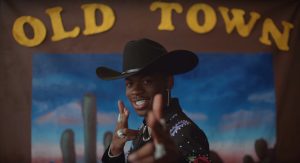
Social media has a huge role in creating music trends. Songs can go viral, and new genres or styles can quickly become popular. Influencers and celebrities often share songs with their followers, helping these songs reach a bigger audience.
Example: The Success of “Old Town Road”
One of the most famous examples of social media driving music success is “Old Town Road” by Lil Nas X. The song went viral on TikTok, leading to its rise to number one on the Billboard charts. This shows how social media can make a song popular almost overnight.
How Social Media Is Changing the Business Side of Music
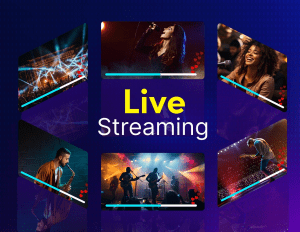
Social media is not just about connecting with fans—it’s also changing the music business. Record labels and artists are now focusing on social media marketing. More artists are taking control of their own careers by managing their social media accounts directly.
New Ways to Make Money on Social Media:
- Selling Merchandise: Artists can sell their merchandise directly to fans on social media platforms.
- Live Streaming: Platforms like Instagram Live or YouTube Live allow artists to host online concerts, earning money through ticket sales or donations.
- Brand Partnerships: As artists grow their social media following, they can work with brands for paid sponsorships.
How Social Media Connects Artists and Fans
Social media makes it easier for artists to communicate directly with their fans. In the past, fans could only interact with their favorite musicians through interviews or fan mail. Today, artists can post updates, respond to comments, and even have live conversations with fans. This helps build a personal connection, making fans feel like they are part of the artist’s journey. Whether it’s sharing behind-the-scenes footage or answering questions, social media allows artists to show their personality and build a loyal fanbase.
Social Media’s Role in Music Discovery
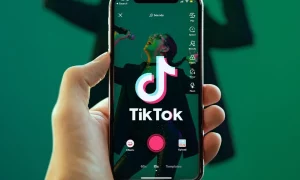
Social media platforms are a great way for people to discover new music. Fans often share their favorite songs with their friends, and this helps music spread quickly. TikTok, for example, has become famous for making songs go viral. A short video can lead to a song gaining millions of views in just a few days. Social media has made it easier for unknown artists to get discovered, allowing them to reach a global audience. This means music discovery is no longer limited to radio or TV.
The Power of Visual Content in Music Promotion
On platforms like Instagram and YouTube, visuals play a big role in promoting music. Artists use photos, videos, and even short clips to show their music in creative ways. Fans can see live performances, sneak peeks of new songs, or videos that explain the story behind the music. These visuals help make the music feel more personal and exciting. For many artists, sharing their visual content is just as important as the music itself in building their brand.
The Role of Hashtags in Music Promotion
Hashtags are a powerful tool for promoting music on social media. Artists and fans use them to share content and reach more people. For example, a unique hashtag for a new album or tour can help fans follow updates and join the conversation. Hashtags also make it easier for new listeners to discover an artist’s music. By using the right hashtags, musicians can ensure their posts appear in front of a wider audience, increasing their reach and visibility.
The Influence of Influencers on Music

Influencers and celebrities on social media can have a huge impact on the success of a song or artist. When a popular influencer shares a song or video, it can quickly reach a huge audience. Many artists collaborate with influencers to promote their music. These collaborations are beneficial for both the artist and the influencer, as they help increase their visibility. As more people turn to social media for music recommendations, influencers play a big role in shaping music trends.
The Need for Consistency in Posting
For artists to stay relevant on social media, they need to post regularly. Social media moves fast, and if an artist doesn’t keep up, they risk losing their audience’s attention. Posting about new music, upcoming events, or even personal moments helps keep the audience engaged. However, this can be difficult, as artists often have a busy schedule with recording, touring, and other commitments. Finding time to post consistently can be a challenge, but it’s important for building and maintaining an online presence.
Social Media Influences the Music Charts
Social media platforms like Twitter and TikTok can have a big impact on a song’s position on the music charts. When a song goes viral on social media, it can quickly gain millions of streams, which can push it to the top of streaming charts. This has become a key part of how songs are discovered and how they rise in popularity. In many ways, social media has changed how music charts are influenced, giving more power to fans and online communities.
Social Media’s Impact on Music Genres and Trends
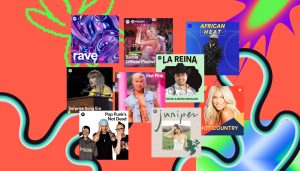
Social media has also influenced the rise of new music genres and trends. For example, music genres like “lo-fi” and “bedroom pop” became popular through platforms like SoundCloud and TikTok. These genres appeal to younger audiences who appreciate the DIY, authentic vibe of the music. Social media gives artists the freedom to experiment and share different types of music, which helps new genres emerge. The ability to share music without needing a record label or big promotion has democratized the music industry, allowing for more diverse sounds to flourish.
Social Media and the Growth of Independent Artists
Social media has made it possible for independent artists to thrive. In the past, musicians had to rely on record labels to get their music out to a large audience. Today, artists can post their music directly on platforms like Instagram, SoundCloud, or Bandcamp, and reach listeners around the world. Social media helps independent musicians grow their fanbase without needing a big budget. This has allowed many talented artists to build careers from the ground up, showing that success is not just about having a major label behind you.
Social Media as a Tool for Feedback
Social media allows artists to receive direct feedback from their fans. Musicians can post new ideas, ask for opinions, or read comments to understand what their audience likes. This feedback helps artists improve and create music that resonates with their fans. For example, an artist might release a snippet of a song and ask fans what they think before finalizing it. This interaction strengthens the bond between artists and fans, making them feel involved in the creative process.
The Challenges of Using Social Media in Music
Even though social media helps artists, it also brings some challenges. Artists need to post regularly to stay visible, which can be tiring. There is also pressure to create viral content, which can be stressful. In addition, negative comments or criticism online can affect an artist’s mental health.
Problems Artists Face:
- Standing Out: With millions of artists online, it’s hard to get noticed.
- Pressure: Artists feel pressure to keep up with social media trends or to post content constantly.
- Mental Health: Negative comments or the pressure to maintain a perfect online image can harm an artist’s mental well-being.
- Algorithm Issues: Social media platforms use algorithms that may limit how many people see an artist’s posts.
The Future of Social Media in the Music Industry

Looking ahead, social media will continue to be a key part of the music industry. As new platforms emerge, artists will have more ways to reach fans and share their music. Social media will likely become even more important in helping artists grow their careers, but it will also bring new challenges. Artists who can find a balance between promoting their music and taking care of their mental health will be best positioned for success in the future. Social media will shape the music industry for years to come, making it easier for both new and established artists to thrive.
Comparison of Social Media Platforms in Music Promotion
| Platform | Main Use | Strengths | Weaknesses |
|---|---|---|---|
| Sharing visuals and updates | High engagement, personal connection | Requires frequent posts, visuals needed | |
| TikTok | Music discovery and trends | Viral potential, broad reach | Fast-moving trends, competition for attention |
| Real-time updates and conversations | Quick engagement, trending hashtags | Can feel overwhelming, quick-paced | |
| YouTube | Video content, music videos | Long-form content, high audience reach | Needs quality video production, competition from other content |
The Impact of Social Media on the Music Industry: An Analysis
| Factor | How It Affects the Music Industry |
|---|---|
| Music Discovery | Social media makes it easier for fans to find new music, helping artists grow their audience. |
| Fan Engagement | Artists build stronger relationships with fans through direct interaction on social media. |
| Music Promotion | Viral moments and trends on social media can push songs to global success. |
| Revenue Opportunities | Social media offers artists new ways to make money, like selling merchandise or hosting live streams. |
Conclusion
Social media is a key part of the music industry today. It helps artists connect with fans, promotes music, and creates new opportunities to earn money. While there are challenges, like staying relevant and dealing with online criticism, the benefits are clear. As social media platforms continue to grow, their influence on the music industry will only become stronger. Artists who understand how to use social media effectively will have a better chance at success.
By embracing the power of social media, artists and music professionals can shape the future of the industry, reach new audiences, and grow their careers in ways that were once unimaginable.






